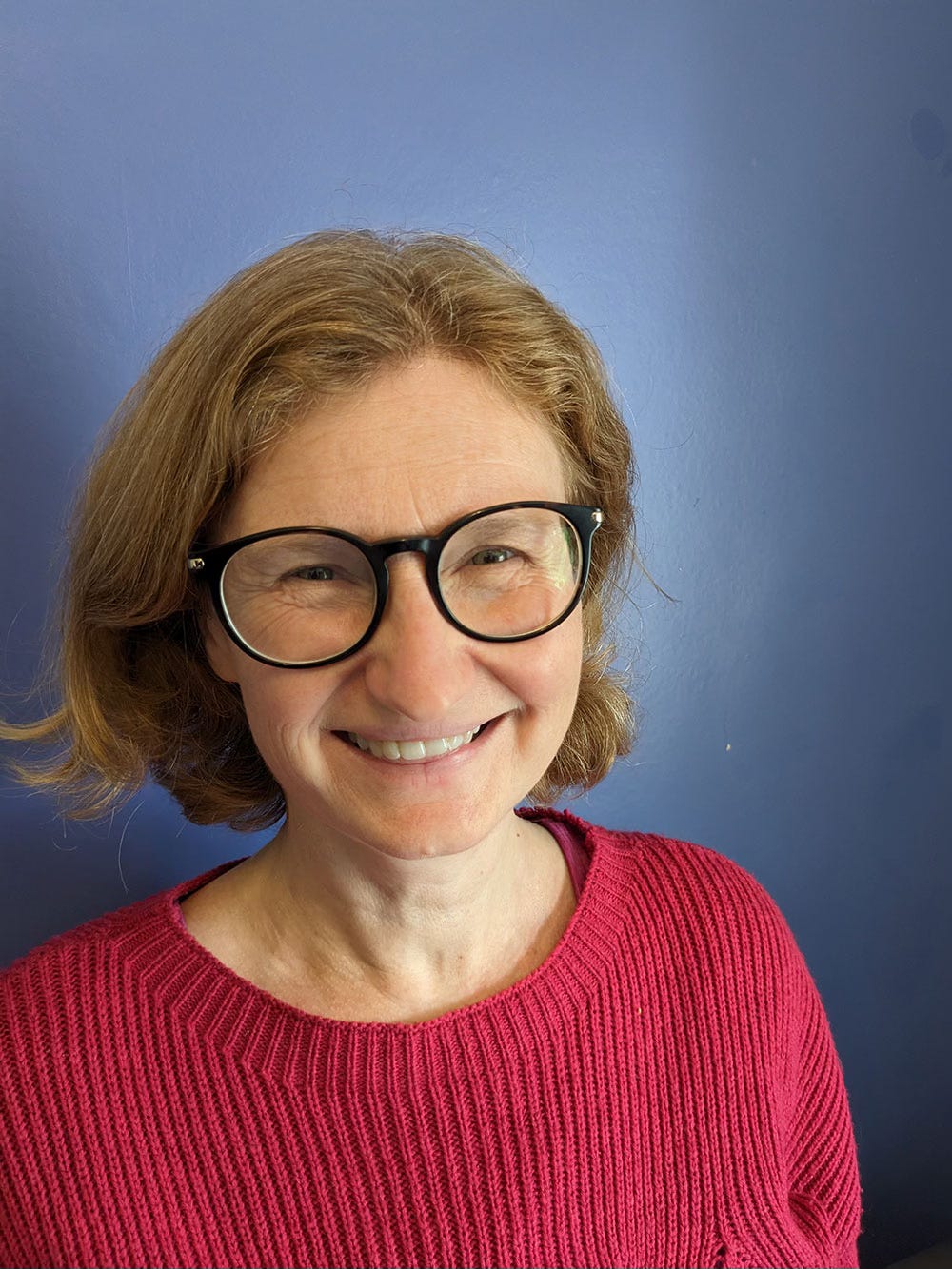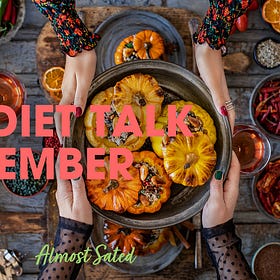'Life is short... I don't want to waste any of it by obsessively focusing on the size of my body'
Buddhist and therapist Satya Robyn on going gently when it comes to food and our bodies.
Hello, everyone. Welcome back to another round of Dared to Ditch, where I profile other people who have made the bold decision to quit diets.
Like most of the people I’ve profiled here, I “met”
through Substack, the platform we publish on. Her newsletter Going Gently is packed full of gentle wisdom, a much-needed balm for us hard-driving folks. She writes frequently about Internal Family Systems, an evidence-based therapeutic modality that helps people access and heal their protective and wounded inner parts. Thanks to Satya’s work, I’ve been able to bring more kindness and compassion to all parts of my being, even the ones I don’t always like.As you’ll discover, Satya’s work with IFS allows her to bring some much-needed compassion to herself when it comes to eating. Like previous Dared to Ditch interviewees
, and , Satya discusses the role the pandemic played in nudging her back to a more balanced way of living and eating. Was this true for you, too? I would love to hear about any massive changes you made during the pandemic.Bio: Satya Robyn writes at Going Gently, which is for folk who sometimes push too hard and who want to ease up and enjoy everything more. She is a Buddhist minister and a psychotherapist using Internal Family Systems. She lives in the Bright Earth temple on the Malvern hills with her spouse Kaspa and dogs Aiko and Ralph. After you read through, please drop us a line in comments and let us know what you think of Satya’s story!
“Life is short... I don't want to waste any of it by obsessively focussing on the size of my body, just because our culture tells me that being a certain size is crucially important to my worth as a person.” —Satya Robyn
Kristi: When did you quit diets?
Satya: I've been in an ongoing process of 'shedding diets' my whole life, if you see 'dieting' as any kind of restriction around what I eat. The biggest recent shedding was a couple of years ago. We were emerging from the pandemic and I'd become a couple of dress sizes bigger than I was before - partly because of lock-down comfort eating, partly because of my age (49) and possibly peri-menopause, partly because of who-knows-what. I begin starting to restrict my eating (or rather attempting to restrict my eating) and I really noticed how it was driving me crazy. Whilst away on holiday I re-read “Intuitive Eating” by [Elyse] Resch and [Evelyn] Tribole, recommitted to unrestricted eating, visited a massive clothes store and bought almost a whole new wardrobe of lovely (slightly bigger) clothes, and felt a thousand percent better.
Kristi: Why did you initially decide to stop dieting?
Satya: My experience of dieting was that it drove me crazy. It made me more likely to obsess about food, and more likely to binge once I'd inevitably fallen off the wagon.
Kristi: What is your “why” now? What keeps you from not dieting again?
Satya: If I'm tempted to start dieting I remember how terrible I felt before my re-reading of “Intuitive Eating.” Life is short... I don't want to waste any of it by obsessively focussing on the size of my body, just because our culture tells me that being a certain size is crucially important to my worth as a person.
Kristi: How did, and does, your work as a therapist and/or Buddhist influence your decisions around food and dieting?
Satya: I am a Pure Land Buddhist, and Pure Land Buddhism begins with the premise that we are all 'bombu' - foolish beings of wayward passions. I have spent decades practising Buddhism, receiving therapy and learning and I can confirm without a doubt that I am still utterly bombu. The wonderful part about Pure Land Buddhism is that we are told we are seen and known by the Buddha in our entirety, with all our flaws, and that nevertheless we are loved and accepted just as we are. This helps me to remember that my body is also accepted just as it is, even if I don't exercise it as much as I should, or do enough stretches, or always feed it the best food.
As a therapist working with Internal Family Systems, I know that my psyche is a delicate and complicated balance of different parts of me, all working to keep me steady and sane. I know that parts of me use food to comfort myself sometimes - that's okay. I know that parts of me think I should eat less or differently - that's okay.
These parts are all doing what they think is best for me - even though sometimes they are doing the opposite thing to each other. From my own experience I know that it helps me to keep listening to all these parts, and to give them some 'leeway' to do what they need to do. I also know that if the 'restricting' parts get carried away, this leads to a backlash and to more eating than I would have done otherwise. I encourage them to ease up, and they are usually fine about this because they also understand that when they crack down it often leads to a backlash. I could write a whole book about this, but that's probably enough for now - if you're interested in Internal Family Systems and eating I'd recommend Kim Daniels from “Your Weight Is Not Your Worth.” https://www.yourweightisnotyourworth.com/
Kristi: What has been the biggest benefit of not dieting?
Satya: The freed up time and energy from not obsessing about food.
Kristi: How does not dieting affect your relationships and social choices?
Satya: I have very occasionally had to speak to a friend and say that it's triggering for me to hear about their diets - there are parts of me that are still looking out for the 'perfect diet' which would result in the 'perfect body' and I want to protect these parts as much as I can! Not dieting means I can go out to eat when I want to, and order what I want - as time goes on I find more and more that I alternate between wanting more calorie-intense food (e.g. yummy vegan cheese-burgers and chips) and food that is more 'green' (e.g. yummy Buddha bowls).
Kristi: How has not dieting impacted how you view diet culture and anti-fat bias?
Satya: I've read a few books about body positivity and it really opened my eyes to the insidiousness of the influence of anti-fat bias. Like other terrible oppressive systems, it causes untold suffering and messes with so many of our heads...
Kristi: How does how you were raised impact your relationship with food and body image?
Satya: I do remember when I was younger that my mum said to me at one point that she was worried about me becoming anorexic, and at another point that she was worried about me getting fat. With our culture the way it is, no wonder! I also remember her saying to me once when I was a teenager (and fretting about food) that she reminded herself when eating something delicious that she could eat it again any time, and so she didn't have to overeat it. I never forgot that and it foreshadowed my learning about intuitive eating decades later.
Kristi: How do you handle the societal pressure around dieting, diet talk, body talk etc.? Do you have any tips to share?
Satya: I think that if I'm feeling confident about my position, which I mostly do, then I'm more immune to all this. If I'm not feeling confident then I try and avoid it for a little while - not always easy I know!
Kristi: Do you have any advice or encouragement to share for those who haven’t yet broken free of diets?
Satya: My main motto is 'go gently' and so I'd try and encourage self-forgiveness and self-compassion. Our relationship with dieting, especially for women, goes DEEP. It strikes at the very heart of who we are and how we feel about ourselves. We can't be expected to 'fix it' as we would fix a broken watch. What we can do is take little steps over time, continue to put ourselves in good conditions, and trust that healing will happen, however slowly. Keep going!
Share Your Story of Ditching Diets
If you’ve found freedom from dieting, we’d love to share your story so that it may inspire someone else…or simply make them feel less alone. Comment below or reach out at at kristik @ substack.com.
How is No Diet Talk December treating you so far?
Just a quick reminder that I am inviting my Almost Sated community (and anyone else) to join me in abstaining from diet talk for the month of December. I’ve already heard from some of you that this series has been helpful—some of you weren’t aware of diet talk, weren’t aware of how much you engage in it or the harm from it. This is a no-judgment zone—we are all here to learn!
If you’d like to join along, here are a few posts you might find helpful:
Introducing...No Diet Talk December
This is the time of year where we tend to talk about how much our bodies have changed, how much we’ve been overeating, how little we’ve been exercising and how we really should get back to the gym—all while gathered in the kitchen loading up on something that’s “bad” for us. Let's change that.
More real talk, please
Since I launched my accountability challenge for the month of the December to not engage in negative "diet talk," you might be wondering how it's going with all my recent events. In the spirit of keeping it real, I’ve approached these gatherings from a place of openness and curiosity. I wondered if diet talk would come up, and if so, how I would handle it.










Thank you for this great interview Kristi and Satya. Bringing awareness about our programmed eating habits is so valuable and you are shining a very bright light on it! Acceptance and allowing take practice. We must begin with baby steps and do them consistently. One of the beautiful things about this process is it transfers to other important areas of our life, or vice versa.
we are all 'bombu' - foolish beings of wayward passions ... This has me so curious to learn more. Definitely going to dig in.